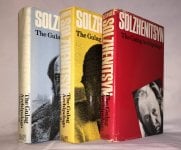doodoo
VIP Member
I have read "War and Peace" by Leo Tolstoy, and I have read "Crime and Punishment" by Fyodor Dostoevsky. Both are Russian novels written the 19th century and both deal with Russia's plight of humanity. But they are vastly different novels. "War and Peace" focuses on humanity, whereas, "Crime and Punishment" focuses on law, psychology, and philosophy. "Crime and Punishment" is a much deeper novel, because it focuses on the unraveling of one individual, whereas "War and Peace" is a vast scape spanning Russian aristocracy in relation to a crumbling and deteriorating military upper Russian class.
The thing I really like about "War and Peace" is that it pulls no punches when delivering Tolstoy's pure, unrelenting humanism. You really get the feeling that Tolstoy cared for humanity, that he really wanted to do good. Dostoevsky, on the other hand, was a dark and terrifying force. I don't necessarily think that one is more valuable than the other, however, for both are great in their own ways.
But if I were to speak in terms of prophecy, I would say that Dostoevsky had more to offer the world. His creativity regarding how dark and sinister humanity really is kind of makes you feel humble. Learning to decipher why someone would actually commit crime is a valuable lesson in how not to. In that sense, I enjoyed Dostoevsky's courage and sincerity in delivering his point.
I would recommend first Tolstoy for anyone who is thinking of getting into Russian literature. "War and Peace" is a work of historical fiction and is easier to get into. If you love characters and plot, Tolstoy is definitely for you. In that sense, he is unmatched. I fell in love with Natasha, the young aristocratic princess, and I felt for Andrew Bolkonsky who was courageous and who loved her with a deep passion. There is so much going on in "War and Peace", that it is definitely impossible to describe it here. There are long and drawn-out battle scenes, with complicated depictions of military tactics, complete with descriptions of formations and such. Those parts you can skip. Tolstoy just threw them in there because he had an interest in how Russia was able to throw back Napoleon at the battle of Waterloo, and how Russia outmaneuvered him here and there.
But if romantic descriptions of Russia during a very aristocratic and romantic time appeal to you, then pick up "War and Peace". You won't find a greater novel anywhere. It is long, yes, but the time you spend reading it is worth it because you can say you read the greatest novel of all time. And also, it will fill a space inside you that you didn't know was there, that cannot be filled by the shit that is cranked out and mass-produced nowadays.
The thing I really like about "War and Peace" is that it pulls no punches when delivering Tolstoy's pure, unrelenting humanism. You really get the feeling that Tolstoy cared for humanity, that he really wanted to do good. Dostoevsky, on the other hand, was a dark and terrifying force. I don't necessarily think that one is more valuable than the other, however, for both are great in their own ways.
But if I were to speak in terms of prophecy, I would say that Dostoevsky had more to offer the world. His creativity regarding how dark and sinister humanity really is kind of makes you feel humble. Learning to decipher why someone would actually commit crime is a valuable lesson in how not to. In that sense, I enjoyed Dostoevsky's courage and sincerity in delivering his point.
I would recommend first Tolstoy for anyone who is thinking of getting into Russian literature. "War and Peace" is a work of historical fiction and is easier to get into. If you love characters and plot, Tolstoy is definitely for you. In that sense, he is unmatched. I fell in love with Natasha, the young aristocratic princess, and I felt for Andrew Bolkonsky who was courageous and who loved her with a deep passion. There is so much going on in "War and Peace", that it is definitely impossible to describe it here. There are long and drawn-out battle scenes, with complicated depictions of military tactics, complete with descriptions of formations and such. Those parts you can skip. Tolstoy just threw them in there because he had an interest in how Russia was able to throw back Napoleon at the battle of Waterloo, and how Russia outmaneuvered him here and there.
But if romantic descriptions of Russia during a very aristocratic and romantic time appeal to you, then pick up "War and Peace". You won't find a greater novel anywhere. It is long, yes, but the time you spend reading it is worth it because you can say you read the greatest novel of all time. And also, it will fill a space inside you that you didn't know was there, that cannot be filled by the shit that is cranked out and mass-produced nowadays.
Last edited:


